| Introduction |
|
I’m just back from Seattle where Fred Kanampiu, Theresa Ampadu-Boakye and Bernard Vanlauwe and I had meetings at the headquarters of the Bill & Melinda Gates Foundation. We were able to discuss progress and learnings with our two senior project officers, Charlene McKoin and Jeff Ehlers. ...
Photo: Fred Kanampiu, Theresa Ampadu-Boakye, Bernard Vanlauwe, Ken Giller saying goodbye to Charlene McKoin and Kristina Muller at the Bill & Melinda Gates Foundation in Seattle, May 26th 2016
|
 |
|
1 |
| Reflections on legume input supply chains from Louise Sperling |
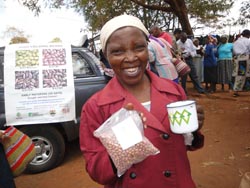 |
New legume varieties are only useful if they reach the smallholder farmers who need them—and right now our track record is abysmal. The largest seed data set in the world (McGuire and Sperling, 2016) shows that smallholders currently source <1% (actually 0.6%!) of legume seed from the formal seed sector dealers – the channel most often supported by development programs. A whopping 65% ... |
|
2 |
| Fully commercialized BNF technologies in Kenya |
| Farmers in west Kenya enjoy ready access to commercialized BNF technologies, in large part due to the efforts of N2Africa and its strategic partnership with both the private sector and the WeRATE network of farmer associations. Commercial partnership with MEA Fertilizers Ltd. has led to the manufacture and distribution of BIOFIX legume inoculant and blending of Sympal, a fertilizer specifically designed for symbiotic legumes. ... |
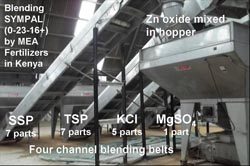 |
|
3 |
| Information plus … the journey towards sustainable change in legume technologies |
|
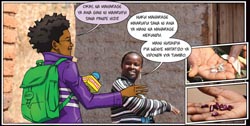
|
George Oduor from CABI explains an new approach to sustainable change in legume technologies.
The goal of any long-term development project is to create sustainable changes in awareness, attitude and ultimately behaviour. In the first phase of the Africa Soil Health Consortium (ASHC) soil fertility projects, ...
Picture from Shujaaz
|
|
4 |
| SAIRLA Sustainable Agricultural Intensification Research and Learning in Africa; Gender and the Legume Alliance: integrating multi-media communications approaches and input brokerage |
| The project ‘Gender and the Legume Alliance: integrating multi-media communications approaches and input brokerage’ is implemented by CABI and N2Africa with grant support from the SAIRLA-programme. This five-year programme commissions research and facilitates multi-scale learning with regard to sustainable agricultural intensification (SAI). The project will support several N2Africa milestones related to feedback of the performance of dissemination models, the effectiveness of input supply and marketing systems, themes and models for women-specific dissemination campaigns and the effectiveness and efficiency of various D&D approaches. ... |
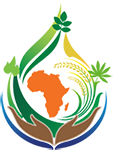 |
|
5 |
| Smart partnership between soyabean seed and inoculant producers in Zimbabwe |
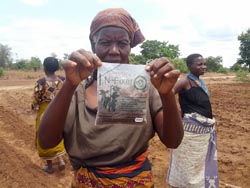 |
Seed Co Limited, a public listed seed company incorporated in Zimbabwe, is the leading producer and marketer of certified crop seeds in southern Africa. Seed Co develops and releases soyabean varieties for Zimbabwe, Zambia, Malawi and South Africa. The seed house has produced a number of specific and high yielding soyabean varieties that are transforming soyabean production for smallholder farmers. This has been a direct result of production of seed products in ecological conditions nearest and similar to end-users’ environments. ... |
|
6 |
| Issues of poor quality seed on the market heat up in Uganda |
|
In the first phase of N2Africa, activities were aimed at facilitating learning within the project through feedback loops. Experiences from dissemination activities were to be monitored and assessed and findings fed back into research as well as planning for next season dissemination activities. Findings from research ...
Table: From related project Integrated Seed Sector Development project (ISSD) in Uganda
|
 |
|
7 |
| Local seed businesses as an alternative route for seed access: Challenges faced in Uganda |
|
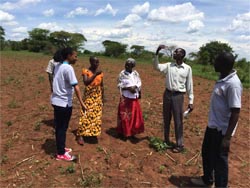
|
In northern Uganda, N2Africa dissemination efforts through demonstrations, adaptations, media events and field days, amongst others, have created demand for grain legume technologies, especially improved soyabean varieties. However, there is a challenge to access the improved varieties from the formal seed systems, because they hardly deal in grain legume seed. ...
Figure: Discussing the poor seed germination rate at the field of Mrs Dorcus
|
|
8 |
| Reviving groundnut production with fertilizers and AflasafeTM in Tanzania |
|
Kongwa district has suitable climatic conditions for growing groundnut and is among the top producers in Tanzania. However, production is being threatened by many factors including declining soil fertility, the changing climate, lack of improved varieties and contamination with aflatoxin -...
Figure: Mr.Anfigwegwe Mwaipopo, a guest of honor, Kongwa District Officer
|
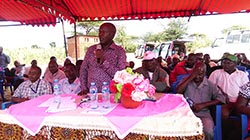 |
|
9 |
| Reports and other output uploaded on the N2Africa website |
The N2Africa Baseline report was published for Ethiopia, Tanzania and Uganda, establishing the initial status of livelihoods through assessment of household characteristics, agricultural production, nutrition and market access. The report provides a benchmark against which the project will be able to assess the progress and achievements towards the end of the project.
The N2Africa M&E and Data Management Master Plan is finished and made available. With this Master Plan, a strategic framework allowing for timely feedback loops, desired level of consistency in design (of research and dissemination) and data collection to allow for meta-analyses across all N2Africa countries is emphasised. It also allows for learning across all focal areas of the project, i.e. agronomy, rhizobiology, dissemination, platforms, gender and communications. As it is a living document updates are to be expected based on progress made.
|
11 |
| Related publications |
New reports have been uploaded for the ESRC-DFID project that we introduced in Podcaster 36. More are to be expected in the near future.
Moritz Reckling, N2Africa MSc student at Wageningen University in 2011-2013, now working at the Leibniz centre for Agriculture Research in Germany described a win-win situation for environment and economy when growing Legumes in the Daily Nations’ Seeds of Gold.
Beyond averages: New approaches to understand heterogeneity and risk of technology success or failure in smallholder farming, a publication by B. Vanlauwe, R. Coe and K.E. Giller was published in Cambridge University Press 2016. This paper describes the challenges facing research, highlighting the importance of variation in evaluating the performance of soil management recommendations, integrating aspects of production risk management within the formulation of recommendations, and proposing alternative approaches to implement agronomic R4D.
|
12 |
| Related news |
KIT (Royal Tropical Institute) and SNV published an interesting working paper "Market-based solutions for input supply: 12 making inputs accessible for smallholder farmers in Africa".
|
13 |
| Announcement |
There is an update on the Second International Legume Society Conference, scheduled to be held at Tróia, Portugal, from 12th to 14th October 2016. Websites: http://ils.nsseme.com/#meet and http://www.itqb.unl.pt/meetings-and-courses/legumes-for-a-sustainable-world/welcome#content.
|
14 |










